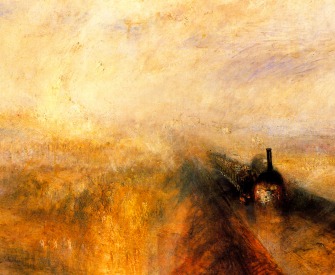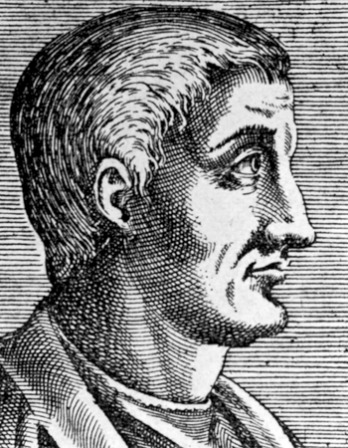We have no sympathy but what is propagated by pleasure: I would not be misunderstood; but wherever we sympathize with pain it will be found that the sympathy is produced and carried on by subtle combinations with pleasure.
We have no knowledge, that is, no general principles drawn from the contemplation of particular facts, but what has been built up by pleasure and exists in us by pleasure alone. The man of science, the chemist and mathematician, whatever difficulties and disgusts they may have had to struggle with, know and feel this. However painful may be the objects with which the anatomist’s knowledge is connected, he feels that his knowledge is pleasure; and where he has no pleasure, he has no knowledge. What then does the poet? He considers man and the objects that surround him as acting and reacting upon each other, so as to produce an infinite complexity of pain and pleasure; he considers man in his own nature and in his ordinary life as contemplating this with a certain quantity of immediate knowledge, with certain convictions, intuitions, and deductions which by habit become of the nature of intuitions; he considers him as looking upon this complex scene of ideas and sensations, and finding everywhere objects that immediately excite in him sympathies which, from the necessities of his nature, are accompanied by an overbalance of enjoyment.

Autopsy of the First Crocodile, Onboard, Upper Egypt, by Ernest Benecke, 1852. Benecke’s amateur photographs, taken while on a grand tour of Egypt and the Mediterranean, arguably make him the world’s first ethnographic photographer. The Metropolitan Museum of Art, Gilman Collection, Purchase, William Talbott Hillman Foundation Gift, 2005.
To this knowledge which all men carry about with them, and to these sympathies in which without any other discipline than that of our daily life we are fitted to take delight, the poet principally directs his attention. He considers man and nature as essentially adapted to each other, and the mind of man as naturally the mirror of the fairest and most interesting qualities of nature. And thus the poet, prompted by this feeling of pleasure which accompanies him through the whole course of his studies, converses with general nature with affections akin to those, which, through labor and length of time, the man of science has raised up in himself, by conversing with those particular parts of nature which are the objects of his studies. The knowledge both of the poet and the man of science is pleasure; but the knowledge of the one cleaves to us as a necessary part of our existence, our natural and unalienable inheritance; the other is a personal and individual acquisition, slow to come to us, and by no habitual and direct sympathy connecting us with our fellow beings. The man of science seeks truth as a remote and unknown benefactor; he cherishes and loves it in his solitude; the poet, singing a song in which all human beings join with him, rejoices in the presence of truth as our visible friend and hourly companion. Poetry is the breath and finer spirit of all knowledge; it is the impassioned expression which is in the countenance of all science. Emphatically may it be said of the poet, as Shakespeare hath said of man, “that he looks before and after.” He is the rock of defense of human nature; an upholder and preserver, carrying everywhere with him relationship and love. In spite of difference of soil and climate, of language and manners, of laws and customs, in spite of things silently gone out of mind and things violently destroyed, the poet binds together by passion and knowledge the vast empire of human society, as it is spread over the whole earth, and over all time. The objects of the poet’s thoughts are everywhere; though the eyes and senses of man are, it is true, his favorite guides, yet he will follow wheresoever he can find an atmosphere of sensation in which to move his wings. Poetry is the first and last of all knowledge—it is as immortal as the heart of man. If the labors of men of science should ever create any material revolution, direct or indirect, in our condition, and in the impressions which we habitually receive, the poet will sleep then no more than at present, but he will be ready to follow the steps of the man of science, not only in those general indirect effects, but he will be at his side, carrying sensation into the midst of the objects of the science itself. The remotest discoveries of the chemist, the botanist, or mineralogist will be as proper objects of the poet’s art as any upon which it can be employed, if the time should ever come when these things shall be familiar to us, and the relations under which they are contemplated by the followers of these respective sciences shall be manifestly and palpably material to us as enjoying and suffering beings. If the time should ever come when what is now called science, thus familiarized to men, shall be ready to put on, as it were, a form of flesh and blood, the poet will lend his divine spirit to aid the transfiguration and will welcome the being thus produced as a dear and genuine inmate of the household of man.
From Lyrical Ballads. Wordsworth and Coleridge were in their twenties when they first published this joint poetry collection anonymously in 1798. (“Wordsworth’s name is nothing,” wrote Coleridge, “mine stinks.”) As they intended the poems to break with a stodgy tradition, a warning was included that readers might “frequently have to struggle with feelings of strangeness and awkwardness.” Two years later, for a new edition, they added this preface. Refined and expanded in 1802, it is considered the inaugurating text of Romantic art.
Back to Issue






